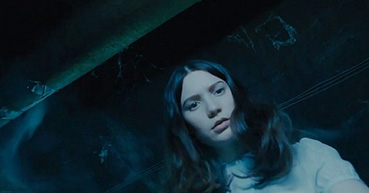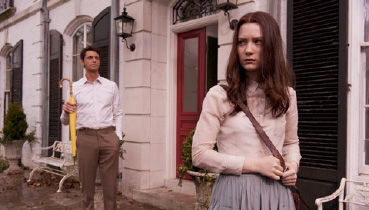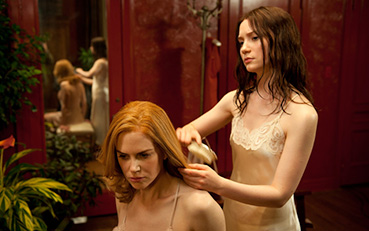"You know I've often wondered why it is we have children in the first
place and the conclusion I've come to is that at some point in our lives
we realize things are messed up beyond repair. So we decide to start
again, wipe the slate clean, start fresh and we have children, little carbon
copies we can turn to and say, you will do things I cannot. You will succeed
where I have failed because we want someone to get it right this time." |
Evelyn (Nicole Kidman) |
Contrary to her questionable reasons for procreation, Evelyn Stoker's parental legacy is set to repeat itself in ways that are anything but right when a mysteriously absent brother-in-law returns to the homestead for her husband's funeral, embroiling her and her daughter in a family love triangle where everybody is hiding from their past and no one gets out alive.
India (Mia Wasikowska) is a sullen isolated girl, who despite coming from the same gene pool, couldn't be more distant from her icily imperious mother (Nicole Kidman). Losing her devoted father (Dermot Mulroney) in questionable circumstances she can't quite come to terms with, India feels as if no one understands her until her uncle Charlie (a career best Matthew Goode) arrives on the scene, bewitching his way into the household with exotic tall tales from abroad and forceful allure. Flirting openly with widowed Evie who welcomes his attention, the real object of Charlie's affectations is India, on whom he uses all his powers of seduction to assuage growing suspicions of his darker purpose.
Nicole Kidman is the marquee name lending Stoker its pulling power for those not familiar with the work of director Park Chan-wook, but it's Wasikowska who's the revelation here, pushing her already remarkable abilities into uncharted, darker waters and definitively marking her transition from old soul pixie girl, to A-list power woman. It's an immaculately internalized, performance, perceptible in the storm clouds that roll across India's fixed expression of deadpan disquiet. With looks that could kill and a look that every proto-goth will soon be coveting, think Wednesday Adams with a bloodlust. Dressed in Victorian gothic garb to match the furnishings of her decorous house, she's also very much a spirit of the age, reading an encyclopedia of funerals and morbidly insisting her scarcely contrite mother mourn the loss of her husband for at least two years.

Park cast Wasikowska for her timeless, classical quality from an indeterminate bygone era, a period look that has already been put to good use in olden worlds both fantastic and real (Alice in Wonderland, Jane Eyre). Screen Daily's David D'Arcy even went so far as to compare Wasikowska's face in close-up to Leonardo's 'Woman with an Ermine'.
India's delicate age and the vulnerable position we find her in, theoretically make her an easy target for Charlie's manipulations but she's not the naive, easily led little girl you might assume. She's well aware of what's going on, yet as the Hitchcockian body count mounts she's complicit in her silence and later, eventual assistance. Marked by tragic loss on the cusp of womanhood, sex and death are gnarled and twisted deep in her psyche, each a confused expression of the other. The repeated image of virginal white flowers stained in blood comes into manifest bloom when uncle Charlie saves his niece from a vicious date rape. The fetishistic means with which Charlie disposes of her attacker is tantamount to an act of fornication; a sexual outer body experience for India akin to orgasm. The transgressive, incestual bent is explicit during a giddy piano duet between India and her uncle, ostensibly the film's love scene with ill-boding notes courtesy of Philip Glass.
So much for teenage purity and innocence. As the film's poster implies with thudding bold font, innocence ends.

Mocked by her male high school peers for her chaste dress sense (and by extension her supposed frigidity), those repressed sexual urges are re-directed violently, with a belt, a gun, even a pencil – India's most formidable and cruel weapon, as sharp as Van Helsing's stake. Like the granddaddy vampire text the film's title evokes, this is one of many overt references to Bram Stoker's Dracula. No fanged creatures are sent back to the hell from whence they came, but like Dracula, this is very much a battle of good and evil hinged on sexuality. He might not have the dentures to match, but imposing himself as man of the manor, uncle Charlie is every inch as smoldering and seductive as the Count of the castle. A cold-hearted snappy dresser of brittle charms, Charlie delights in pushing buttons and making those he riles swoon in his penetrating gaze. So unnerving is his meticulous self-presentation and millpond composure, that simply raising his voice is enough for Goode to make the audience hang on his every word and without realizing, you finding yourself leaning into the actor, waiting for the full horror of the Norman Bates double life to reveal itself behind the contemptible smirk everyone but India mistakes for a smile.
Hitchcock is of course another major touchstone. A neon bathed motel killing can't help but remind of Psycho and Wentworth Miller's 2010 Black List script is for all intents and purposes a re-working of Shadow of Doubt, the poisonous personality of that film also going by the name of Charlie. It must be said that for all its points of reference, the film never feels indebted in anyway. Wook's fine machining of his influences and the way he symphonically conducts all elements of the mise en scène mean that the film remains uniquely his. His thumbprint is all over the film, be it scene transitions (a hair brush runs through Nicole Kidman's hair which morphs into a blustery grass field) or amplified sound (the sharpening of a bloody pencil squelches like an impaled heart).
In any review you might care to read, mention will be made of Hitch and Bram, and the manner in which the film blends genres of different eras. To that list, I'll add the noir sub genre of the mentally troubled home invader – specifically John Brahm's 1944 suspense thriller Guest in the House. In that film, the intruder is a mentally unstable woman, brought to the family home by her doctor fiancée for the loving, secure environment and some much-needed seaside air. Like Charlie, she's a disturbed nut job ripping apart the veneer of domestic calm, though this woman – also named Evelyn – has as much in common with the lady of the Stoker residence as their unexpected visitor. Both immediately fall for the brother of their significant other and just like Evelyn Stoker, Evelyn Heath's visage of propriety crumbles as she comes to realize how profoundly unhappy she is, eventually felling to mental collapse.

Scenes of the three family members set around the dinner table replace poker chips with clenched knives and forks, Evelyn the first to reveal her tell. As a fragile woman projecting strength in the middle of this battle of wills between an oppressive mentor and his repressed tutee, Nicole Kidman is superb as a controlling mother losing control. As in The Others and The Invasion, Kidman's incremental breakdown is precisely modulated, her porcelain features the perfect surface on which to watch visible hairline cracks develop into a spider web of fissures. Charlie's rigorous confidence and India's perpetual mistrust are methods of distraction, ways to hide the things inside that even they themselves don't understand. Enigmatically guarded Evelyn hides what she understands all too well; the mistakes too late to do over at her age, her emptiness inside and all the things that are no longer there. Chung Chung-hoon's cinematography accentuates this unspoken power play by framing rooms in such a way they seem to expand and contract to fit the dominant personality.
Credit to both Miller and Wook that Stoker's storytelling is so commandingly visual you often wonder where the directions of the script end and the inspirations of its helmer begin.
The characters are so haunted by their past that it remains vividly present, India becoming a participant in memories related to her for the first time by her uncle. Editor Nicolas De Toth is the unsung hero here, creating a seamless, overlapping flow between headspace and real space. A reverse angle of India's face being sprayed with blood in the present as Charlie takes a rock and pounds a face to a pulp in the past is his pièce de résistance.

This is all part of Wook's overriding autership, packing every scene with striking compositions, indelible images and unforgettable moments. From the edgy freeze frames of the opening titles to a grizzly basement discovery under a swinging lampshade and shots of India encircled by boxes of identical shoes, this densely ravelled potboiler is visualized with verve, and an acute sense of sinister atmosphere that vibrates on the screen.
With plenty of pleasurable suspense, and psychologically sound stylistics, Wook's crafting of such a richly textured thriller is that rare example of a distinct foreign filmmaker not being repackaged by the Hollywood machine and co-opted into making product stripped of everything that makes their artistry unique. Juan Antonio Bayona's The Impossible aside, there's a depressing abundance of recent examples. Fellow native Korean Kim Ji-woon went from the viscerally disturbing I Saw the Devil to the lumbering action set pieces of eighties Schwarzenegger relic The Last Stand, whilst Norwegian Tommy Wirkola made high concept Nazi zom-com Dead Snow before shaming himself with Hansel & Gretel: Witch Hunters, a film sorely missing a funny bone but filled with unintentional comedy. Pleasingly, Stoker shows no sign of any artistic compromise whatsoever and we can only hope that Wook makes good on his word to do another film in English before returning to Korea. On his first attempt he's made a sleek, shimmering masterpiece that will certainly reward with multiple viewings while eagerly awaiting his second. |